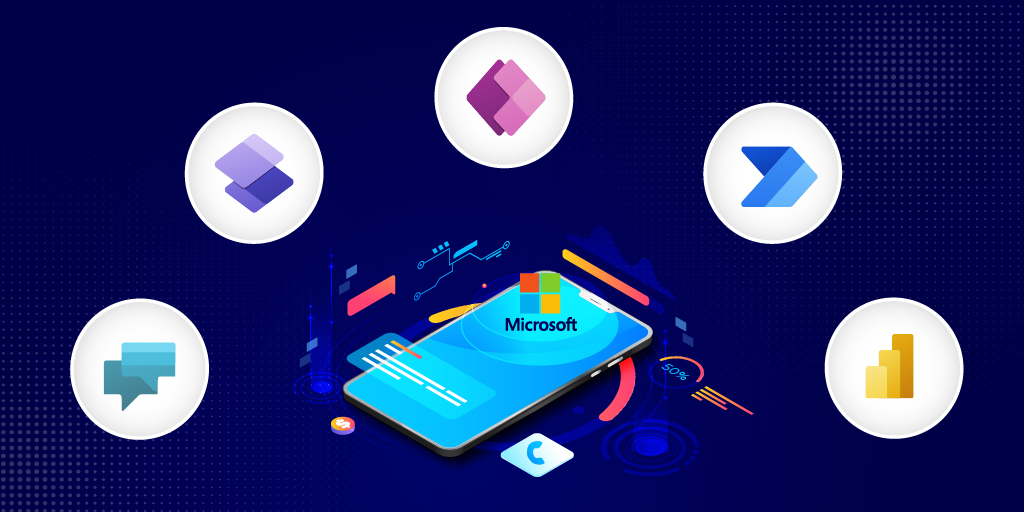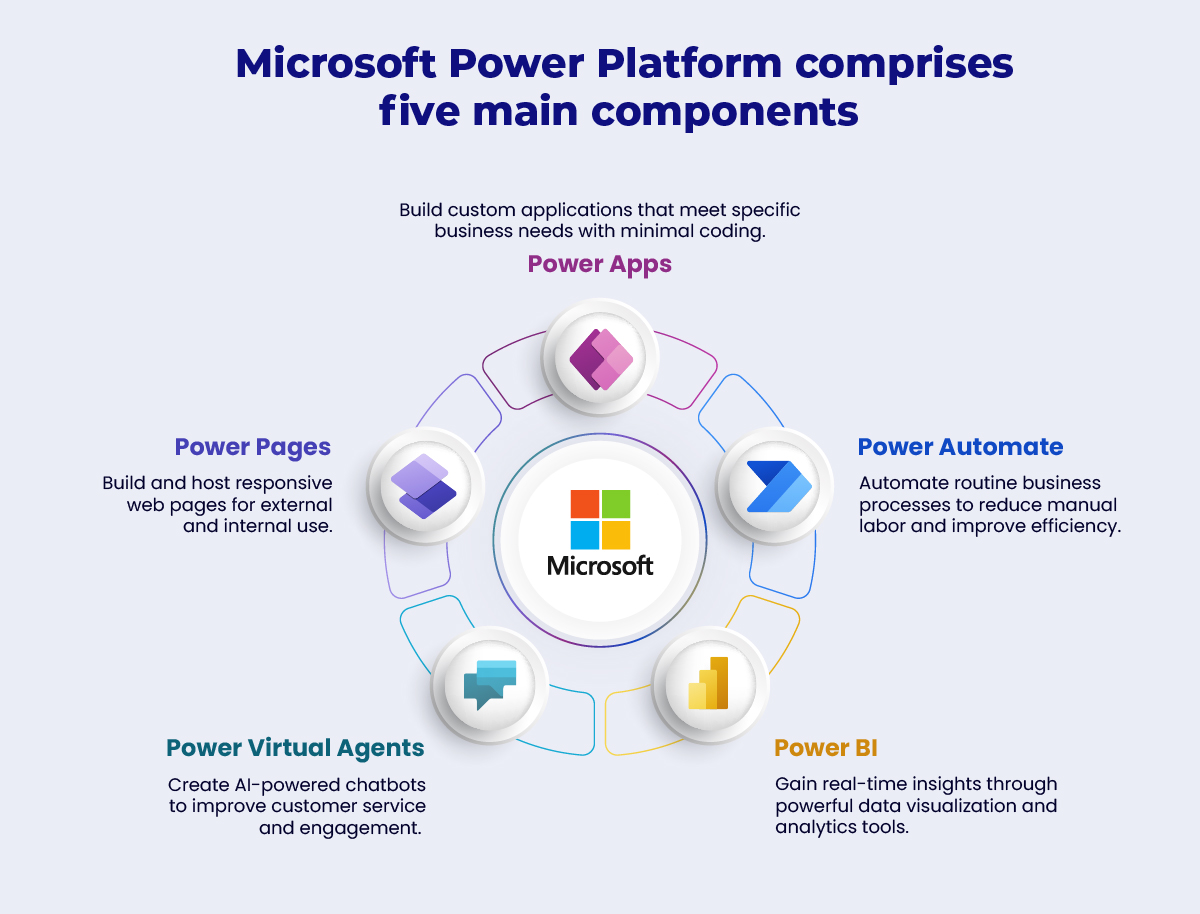For businessses in the B2B space, the ability to quickly respond to market changes, streamline operations, and make data-driven decisions is more critical than ever. Since they operate in complex environments and rely heavily on digital tools to deliver services to clients, adopting innovative technologies that enable agility, and efficiency is key to staying ahead. One such technology that has proven its worth across industries is Microsoft Power Platform—a comprehensive, low-code solution designed to help businesses build custom apps, automate workflows, and gain actionable insights.
97% of Fortune 500 companies are using Power Platform, demonstrating its acceptance among leading enterprises. (Source: Microsoft)
In this blog, we’ll explore the applications and benefits of Power Platform for B2B product and service spaces, emphasizing how it can help businesses modernize their legacy systems, improve operational efficiency, and foster innovation. We’ll also highlight how Microsoft Fabric services complement Power Platform, offering businesses a unified, scalable data solution to support their digital transformation journey.
What is Microsoft Power Platform?
At its core, Microsoft Power Platform is a collection of low-code/no-code tools that empower users to create business solutions without the need for extensive coding knowledge.
Microsoft Power Platform comprises five main components
- Power Apps: Build custom applications that meet specific business needs with minimal coding.
- Power Automate: Automate routine business processes to reduce manual labor and improve efficiency.
- Power BI: Gain real-time insights through powerful data visualization and analytics tools.
- Power Virtual Agents: Create AI-powered chatbots to improve customer service and engagement.
- Power Pages: Build and host responsive web pages for external and internal use.
5 Major Benefits Your Organization Can Get Power Platform
By integrating seamlessly with other Microsoft services like Office 365, Azure, and Dynamics 365, Power Platform enables businesses to create solutions that drive efficiency, improve productivity, and foster innovation.
According to Forrester, businesses utilizing Power Platform have seen up to 48% reductions in development costs, along with significant improvements in productivity.
1. Enhanced Efficiency and Productivity
Power Platform offers a suite of tools designed to streamline processes and boost productivity:
- Automating Routine Tasks: Power Automate enables businesses to automate repetitive tasks such as data entry, report generation, and workflow approvals.
- Real-Time Data Insights for Better Decisions: Power BI allows decision-makers to leverage real-time data analytics, enabling faster and more accurate decision-making all from a single dashboard.
- Custom Solutions for Unique Business Needs: With Power Apps, businesses can develop custom applications tailored to their unique workflows and challenges.
2. Cost-Effective Solutions with Low-Code Development
In a market where development costs are rising, Power Platform’s low-code/no-code approach presents an attractive alternative:
- Lower Development Costs: Developing custom solutions traditionally requires large teams of developers, lengthy timelines, and significant investment. Power Platform reduces these costs by enabling non-developers to create functional apps and automation with drag-and-drop features and pre-built templates.
- Reduced IT Burden: Many industries struggle with the challenge of maintaining complex IT infrastructure. Power Platform helps ease this burden by allowing users to build and manage solutions without requiring constant IT intervention.
- Scalability and Flexibility: As businesses grow, Power Platform scales effortlessly with them. Whether you’re expanding into new markets or scaling operations to meet increasing demand, Power Platform can grow and evolve alongside your business, offering flexibility to adapt to changing requirements.
3. Tailored Solutions for Specific Industries
One of the most significant benefits of Power Platform is its versatility across industries:
- Healthcare: Power Platform can be used to automate patient management systems, streamline appointment scheduling, and improve the delivery of care by integrating with existing electronic health record (EHR) systems.
- Finance: Financial institutions can use Power BI to monitor transactions in real-time, ensuring compliance with regulations while optimizing risk management and customer service.
- Manufacturing: Power Automate can help manufacturers automate supply chain processes, from procurement to inventory management, allowing them to improve operational efficiency and reduce costs.
4. Improved Customer Experience
A key differentiator for any B2B business is the ability to deliver exceptional customer experiences. Power Platform helps businesses achieve this by enabling personalized, data-driven customer interactions:
- Personalized Engagement: Power Virtual Agents allows companies to build AI-driven chatbots that offer personalized customer support without requiring human intervention.
- Data-Driven Insights: With Power BI, businesses can analyze customer data to uncover valuable insights about customer behavior and preferences. This information can then be used to personalize marketing strategies and improve product offerings.
- Faster Time-to-Market: With Power Apps, businesses can prototype and launch new applications in days rather than months. This speed allows companies to be more agile in responding to changing market demands or launching new products and services
5. Application Modernization
Many industries rely on outdated legacy systems that limit their ability to innovate. Power Platform offers a path to modernization:
- Legacy Application Modernization: Businesses can leverage Power Platform to modernize legacy applications, transforming them into more efficient, flexible, and scalable solutions. This modernization process ensures that businesses remain competitive in today’s digital landscape.
- Unified Data Analytics: By integrating Power BI with Microsoft Fabric, businesses can create a unified data analytics platform that consolidates data from multiple sources. This unified approach enables better decision-making and provides a single source of truth for all business operations.
Industry Use Cases and Examples
Microsoft Power Platform has been successfully implemented by various industries to solve real-world challenges. Some notable names are:
- G&J Pepsi-Cola Bottlers: Used Power Platform to streamline their inventory management and sales processes. By creating custom apps with Power Apps and automating workflows with Power Automate, they reduced manual data entry and improved operational efficiency.
- SNCF (French National Railway Company): Leveraged Power Platform to develop a mobile app for their maintenance teams. This app helped in real-time tracking of maintenance activities, leading to improved service reliability and reduced downtime.
- T-Mobile: Utilized Power Platform to automate their customer service processes. By integrating Power Virtual Agents with their existing systems, they were able to handle customer queries more efficiently, reducing response times and improving customer satisfaction.
Additionally, 70,000 new organizations have adopted Power Apps this year, reflecting the platform’s increasing popularity. (Microsoft)
Competitor Landscape: Why Power Platform Stands Out?
The widespread adoption of Power Platform underscores its effectiveness in solving business challenges. When comparing to other low-code/no-code platforms like Mendix, OutSystems, Appian, and Pega, several unique advantages stand out:
- Integration with Microsoft Ecosystem: Power Platform seamlessly integrates with other Microsoft products like Office 365, Azure, and Dynamics 365, providing a unified experience.
- Extensive Data Connectivity: It offers over 400 connectors to various data sources (including SQL Server, SharePoint, and third-party services), making it easier to integrate with existing systems. Users can create custom connectors to integrate with proprietary systems or APIs.
- AI and Analytics Capabilities: Power Platform includes AI Builder and Power BI, enabling users to incorporate AI and advanced analytics into their apps without extensive coding.
- Security and Compliance: Power Platform integrates with Azure Active Directory and offers advanced data encryption, ensuring that sensitive data is protected at all times. It also helps businesses meet industry-specific regulatory requirements by offering compliance certifications such as ISO 27001 and GDPR.
Leverage Microsoft Fabric with Power Platform for Industry Transformation
As businesses continue to navigate digital transformation, Microsoft Power Platform provides the tools needed to build custom applications, automate workflows, and gain actionable insights, all while reducing costs and improving efficiency. When paired with Microsoft Fabric, businesses can unlock even more potential, creating a unified, scalable solution that drives long-term growth.
PreludeSys offers expert consulting services in Microsoft Fabric and Power Platform, helping businesses modernize their legacy systems, streamline operations, and achieve digital transformation. By partnering with us, your business can harness the full power of these tools to stay competitive in today’s dynamic market.
Let’s explore how Microsoft Power Platform and Fabric can transform your business—contact us today to get started!










